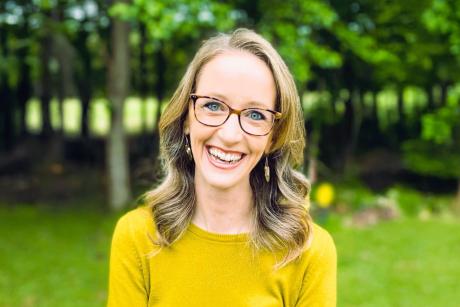
When the pandemic prevented Duke student Iris Liang from traveling to China, she shifted gears and studied how mental health services were adapting to COVID restrictions.
Published May 12, 2021 under Student Stories
One year ago, I was planning to spend my summer in Chengdu, China as a volunteer for Hope Clubhouse, a nonprofit organization that provides services for people with a history of mental illness. Hope Clubhouse is part of a global network called Clubhouse International, and as a psychology major with an interest in global mental health, I wanted to explore similarities and differences between its services and those offered in affiliated clubhouses in North America. This experience was going to be the focus of my independent study project, supervised by Dr. Sumi Ariely, associate professor of the practice of global health.
Obviously, my trip didn’t happen because of the pandemic. However, in the process of adapting my project as well as observing how clubhouses around the world adapted to serve their residents, I learned that every challenge is an opportunity for innovation.
At Hope Clubhouse in China, I was going to teach English classes, plan group activities, and translate administrative documents. Although my plan had to be revised due to the pandemic, I still adhered to the core ideas of my original proposal. For example, I was able to facilitate English lessons remotely. From March to August of last year, I led online English lessons each week for 10 to 15 adult members . For the first three months, they tuned in from their own homes via a video conferencing software. As China recovered from the pandemic, more and more members gathered in a classroom at Hope Clubhouse to attend the lessons as a group.
During the first few lessons, I was solely focused on introducing new grammar, and I became a bit frustrated when the members expressed minimal interest in the material. The staff at the clubhouse kindly advised me that these lessons were more about building confidence and interpersonal skills than becoming fluent in the language. With this understanding, I incorporated weekly discussions about members’ hobbies and interests into the lessons so that they could interact with their peers while practicing the concepts they learned.
At first, most members did not speak up since they lacked confidence in their English skills. I encouraged them to start with basic sentences and shared my personal experience of learning three new languages. I told them that I made many mistakes in the process, but knew that the quickest way to improve was to keep practicing. My story seemed to motivate the members. Several of them reached out to me to chat about challenges they were facing in the class and my advice for them.
One common theme I noticed during these conversations was the need for a trustworthy person who continuously encouraged members to step outside their comfort zone. During the summer, I became that person for the members in my class. Gradually, more members participated in the weekly discussions and seemed less afraid of making a mistake when speaking in English. By July, each lesson ran long because there were so many questions and comments.
This experience helped me gain insight into the holistic nature of mental health. As a volunteer at Hope, I witnessed first-hand how much the members valued having people who supported and cared about them. In fact, many of the services provided at the clubhouse seemed to have similar goals. Staff and volunteers always aimed to convey a clear message that the members can rely on them, as well as on one another.
The safe and welcoming environment allows the members to develop a sense of belonging in the clubhouse community. They become more comfortable with social interactions and improve soft skills such as communication, teamwork and self-discipline. As a result, they are able to recover and reintegrate into society much more quickly.
At the same time, I was reaching out to clubhouses in different parts of the world to see how their services and programs compared. It was fascinating to analyze the similarities and differences among clubhouses in different regions. While all clubhouses followed the same guiding principles, they each adjusted their programming to meet the needs of the communities they served.
Those differences were especially apparent in how individual clubhouses dealt with COVID-19. Several clubhouses that I interviewed reported that the clubhouse model was not built to cope with a global pandemic. In fact, many members were hesitant to stay engaged with the clubhouse. To solve this problem, each clubhouse put in much effort to come up with innovative ways to support the members while promoting social distancing. For instance, two clubhouses in California started running a meal delivery program that provided 15,000 lunches. Another clubhouse focused on facilitating online music stations, book clubs, and journaling groups to help members relieve stress and improve mental well-being.
The independent study gave me the opportunity to grow, as well. I have been interested in global populations and how they live since high school. When I got my first part-time job, I used the income to sponsor a boy in Uganda through World Vision and exchanged postcards with him several times each year, learning about his life and his community. Having friends and family in multiple countries further sparked my interest in how issues such as mental health are dealt with in different parts of the world. Naturally, I was drawn to the global reach, immersive learning, and community engagement of the DukeEngage program. Although I did not end up participating due to complications of the pandemic, the proposal I created for the program became the foundation of my independent study.
My project taught me how to think about the challenges facing vulnerable populations in a research context. I was able to study how a nonprofit like Clubhouse International understands the needs of the different communities it serves, and how services are designed to effectively meet those needs. In the process, I realized that the key goal was to create synergy between the nonprofit and the community being served. As new challenges, such as a pandemic, disrupt the community, the nonprofit quickly adapts by coming up with innovative strategies that not only aim to restore balance, but also to build long-term resilience in both the nonprofit and the community.
It is only through research that one can gain such insights, which are important yet subtle. Furthermore, with well-conducted research that investigates the changes made by the nonprofits and tracks their impact over a period of time, we can learn to deal with future challenges more efficiently and benefit from mutual learning between nonprofits.
Having never done research in high school, I was new to many aspects of the research process, such as creating a proposal, preparing a research poster, and writing a final research paper. The experience was quite different from completing assignments for other courses. I initially had trouble synthesizing everything I observed over the past year and a half and putting them into words, but Dr. Ariely guided me through every step.
In addition, I had never worked with nonprofit organizations across three continents at the same time. I sometimes faced challenges in getting timely responses from clubhouses, particularly given global time differences. I tried to schedule calls at times that worked best for the staff, followed up regularly, and kept clubhouses updated on my progress. I also learned how to pitch my project idea to gain support from other clubhouses around the world.
. This project was a great complement to my academic interests as well. I plan to learn more about research in the field of mental health and stay in touch with the clubhouses I worked with. In fact, I promised the director of Hope Clubhouse that the next time I go to China, I would visit the members, staff, and volunteers in-person.
Iris Liang is a rising junior majoring in economics and psychology at Duke. Read more about her research project here.


